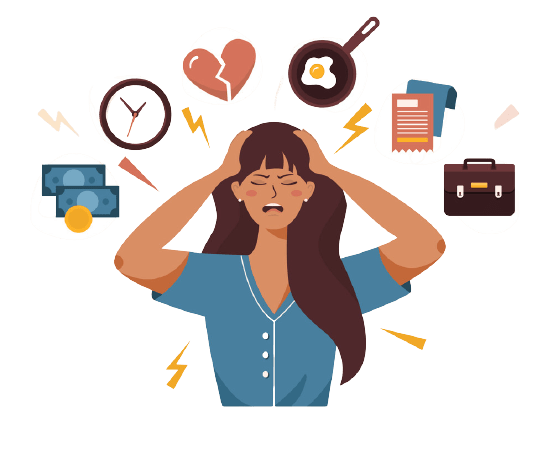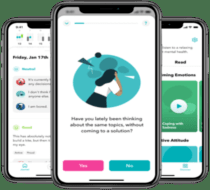Online anger Counseling | Best therapist for anger help
- Affordable and confidential online anger counseling sessions
- Video calls or chat sessions with Counsellors/ Psychologists specialized in anger issues
- Improve your mental wellbeing whenever and wherever you want
Begin Therapy
Consult online with best Therapist
"*" indicates required fields
A ‘Better’ Model for anger Counseling
Mantracare is with you on the journey to heal your anger. We will help you right from knowing the root causes of your anger to learning healthy coping mechanisms. We provide affordable online anger counseling and therapy. Our therapies are 100% online and are conducted via video call or messages. So, feel free to take sessions wherever, whenever you need it
Specialized Therapists
As per your story and case, we assign the best counsellors experienced in anger issues. They work with you proactively to understand and address the root cause of your anger, hopelessness and persistent sadness.
Affordable & Effective
We believe that therapies should be driven more by “Need” than “ability to pay”. Our online sessions are 90% less expensive than face-to-face therapy. Online counseling starts at just $10.
Anger Self Care
We provide you continuous anger help with self-care tools, mental healing videos, chat groups, meditations, breathing exercises and more. Our therapists are available 24/7 via messages to provide care, whenever and wherever you need it.

Best anger Counselling, Now in Your Pocket
Our therapists or counselors are available in all parts of the world, accessible via an easy-to-use mobile application. Our matching experts take your preferences into consideration and connect you with therapists specialized in anger issues. Movever, there are hundreds of free self help tools on our app, available 24×7.

How It Works
After filling out our questionnaire, you will be matched with an anger counselor based on your needs and preferences. You and your counselor will get your own secure and private “therapy room” where you can message your counselor at any time wherever you are. You can also schedule a session so speak live with your counselor over video or phone.
You can write or talk about anger, the things going on in your life, ask questions, and discuss the challenges you’re facing and your counselor will provide feedback, insights, and guidance. Together you’ll work towards making a positive change in your life, accomplishing your goals, and overcoming your anger.

Signup for anger counselling
Just fill up a 5-minute online form to tell us about your anger symptoms and treatment expectations.

Meet your Therapist
Based on your preferences and neet, we will connect you with Depression counselors that are available 24/7 to you via call or chat.

Connect to our app
Heal yourself with video or chat counselling sessions available in the app. Access helpful self-care tools on our app to help you heal your depression, and take control of your life
Meet the best anger Therapists
MantraCare psychologists help you counter anger through a combination of positive conversations, exercises, and meditations. Our anger therapy services are better than traditional face-to-face counseling in multiple ways:
- Over 5,000 counselors & therapists with expertise in anger and other areas
- All counselors are licensed, trained, accredited and highly experienced
- Match with an available counselor who is the best fit for your anger needs
- Unlimited private one on one communication with your therapist
- Gain access to constructive, educational group webinars on anger

A Guide on Anger
Understanding anger
Anger is a strong emotion of dissatisfaction. Stress, failure, or injustice are common triggers. Anger may range from moderate annoyance to outright fury.
Anger is a natural emotion to have. Anger is a reasonable response to the acts of others at times. Anger, when properly handled and controlled, may be a valuable ally to a healthy adult.
However, rage, maybe more than any other emotion, has hazards. It has the potential to isolate people from others and lead to them doing actions they later regret. People who experience long-term, intense anger may find it beneficial to talk to a therapist about what are the causes of it and how to deal with it.
Anger issues types
Anger may appear in a variety of ways. Anger isn’t always conveyed in the same manner. Anger and aggressiveness may be expressed in three ways: external, internal, and passive.
Outward:This entails displaying your rage and violence in a public manner. Shouting, swearing, throwing or smashing items, or verbally or physically abusing others are examples of this type of conduct.
Inward: This is a form of rage aimed against oneself. It entails negative self-talk, denial of things that make you joyful, and even denial of fundamental requirements like eating. Anger can also be channelled inward by self-harming or isolating oneself from others.
Passive: This entails expressing your displeasure in subtle and indirect ways. Giving someone the silent treatment, pouting, being snarky, and making nasty remarks are all examples of passive aggressive conduct.
What causes anger?
Various factors can cause anger. Bullying, humiliation, and loss are examples of external causes that might provoke it. Anger can be triggered by internal reasons such as dissatisfaction or failure.
Anger isn’t necessarily a reaction to the current situation. Unconsciously, a circumstance might remind a person of a previous experience. A person’s wrath from the past might be transferred to the present circumstance.
Anger is usually more about how a person reacts to an incident than it is about the event itself. An eruption of rage is frequently preceded by certain negative thinking processes. These are some of the patterns:
Blaming is when someone argues that unpleasant events or feelings are always the fault of someone else. Blaming others is a common tactic used to avoid taking responsibility or facing embarrassment.
Overgeneralization: When a person thinks in black and white terms. In this pattern, the phrases “always” and “never” are frequently used. Overgeneralizing can make a problem appear more serious than it is.
Rigidity occurs when a person is unable to reconcile what is taking place with what they believe should be taking place. It’s possible that the person has a poor tolerance for frustration.
Mind-reading: When a person convinces themselves that another person has purposefully injured or mistreated them, this is known as mind-reading. The person may sense animosity when none exists.
Collecting straws: When a person mentally tallies items to explain their rage, they are collecting straws. They allow little occurrences to pile up in their heads until they reach “the final straw.” The person’s rage then boils over in a response that most people consider to be excessive.
Anger issues symptoms
Anger manifests itself in both physical and emotional manifestations. While it’s obvious to have these symptoms on occasion, a person with anger difficulties has them more frequently and to a greater extent.
Physical symptoms
Anger has an impact on several sections of the body, including the heart, brain, and muscles. Anger produces a rise in testosterone and a reduction in cortisol, according to a 2011 research.
Anger’s bodily indications and symptoms include:
- blood pressure has risen
- a faster heartbeat
- feeling of tingling
- muscular tenseness
Emotional Symptoms
There are a variety of emotions that are linked to rage. Before, during, or after an outburst of anger or rage, you may experience the following emotional symptoms:
- irritability
- anxiety,
- rage,
- tension,
- stress,
- guilt
- frustration.
Anger Management:
Anger management is the process of learning to recognise when you’re getting upset and then taking steps to calm down and deal with the situation effectively. Anger management does not aim to prevent you from feeling angry or urge you to suppress your feelings. When you know how to express anger correctly, it’s a natural and healthy feeling; anger management is all about knowing how to do that.
Need of Anger Management:
Anger management assists you in recognising and resolving difficulties in a way that allows you to express your demands while remaining calm and in control.
The following are some indicators that you need help regulating your anger:
- Feeling compelled to contain your rage on a regular basis
- Unpleasant thinking and concentrating on negative events on a regular basis
- Irritation, impatience, and anger are constant sentiments.
- Arguments with people on a regular basis that exacerbate tensions
- Physical violence, such as striking your partner or children or initiating fights are all examples of physical violence.
- Violent threats against individuals or property
- Breaking objects or driving dangerously are examples of out-of-control or frightening conduct.
- Because of anxiety or despair, people avoid circumstances where they could have an outburst of rage.
Tips to manage anger:
- Think before you speak
- Once you’re calm, express your anger
- Get some exercise
- Take a timeout
- Identify possible solutions
- Stick with ‘I’ statements
- Don’t hold a grudge
- Use humor to release tension
- Practice relaxation skills
- Know when to seek help
Anger therapy:
Therapy is an important part of addressing persistent anger problems. Rather than repressing your anger, counselling aims to assist you in working through it so that you may have a healthier, more balanced relationship with your emotions.
Based on the degree of your anger as well as the underlying reason, a mental health expert might provide particular therapy suggestions (s). If the anger of a loved one is impacting you, you may benefit from counselling.
The following are some of the most successful kinds of Anger treatment.
- Cognitive behavioural therapy (CBT) is a type of therapy (CBT)
CBT is a type of psychotherapy that is utilised in a number of different mental health treatment regimens. It works by assisting you in recognising what causes your anger and how you typically respond to such situations. - Psychodynamic treatment (PDT) is a kind of psycho
If you’re worried that your anger is taking over your life and harming those around you, a therapist may suggest psychodynamic therapy.
Self-reflection is emphasised in this form of treatment. It relieves inner stress by revealing your latent motivations.
- Group Therapy: Chronic anger may have a negative impact on your self-esteem, making you feel guilty and alone. Group therapy can help in these situations. These sessions, which are led by a professional, allow participants to meet on a regular basis, such as weekly or monthly.
Group therapy has the advantage of making you feel less alone during your treatment. - Play therapy is a type of psychotherapy that is tailored to the needs of young children. A qualified therapist will utilise creative types of play to help youngsters communicate their feelings and thoughts throughout these sessions. Puppets, sand boxes, painting, music, and other forms of play may be used.
10,000+ Happy & Healed anger patients

“The team of MantraCare has extremely caring and effective psychologists who helped me to gain control over my anger issues. Initially, I was in doubt of what to expect from Mantra Care Online Anger Therapy but it didn’t take long for me to realise that this is exactly what I wanted.”
Kevin, 1 year on MantraCare
5000+ Anger Counselors from across the world








Our therapists take care of your ‘unique’ needs
Not all mental health problems are the same. Different types of problems require different treatments. At MantraCare, 5000+ therapist’s cover a range of specialities to meet your needs:
Frequently Ask Questions
Anger is a strong emotion of dissatisfaction. Stress, failure, or injustice are common triggers. Anger may range from moderate annoyance to outright fury.
Some of the common symptoms of anger are
- clenching your jaws or grinding your teeth.
- headache.
- stomach aches.
- increased and rapid heart rate.
- sweating, especially your palms.
- feeling hot in the neck/face.
- shaking or trembling.
- dizziness.
Anger can be triggered by a variety of factors, including losing patience, feeling as if your viewpoint or efforts aren’t valued, and injustice. Anger can also be triggered by recollections of painful or upsetting experiences, as well as worrying about personal issues.
Anger can be of following types:
- Assertive.
- Behavioral.
- Chronic.
- Judgmental.
- Overwhelmed.
- Passive Aggressive.
- Retaliatory.
- Self-Abusive.
When anger becomes a major concern, it starts causing troubles in your day-to-day life. You will not be able to concentrate even after trying so hard. You will unnecessarily start feeling annoyed and raged all the time.
Some of the most serious complications of major anger are
- headache.
- digestion problems, such as abdominal pain.
- insomnia.
- increased anxiety.
- depression.
- high blood pressure.
- skin problems, such as eczema.
- heart attack.
Untreated anger issues have an influence on a person’s mental health. Loneliness, persistent anxiety, depression, eating disorders, sleep problems, obsessive-compulsive behaviour, and phobias have all been related in studies.
Online anger therapy has been proven to have the same effectiveness as in-person therapy. There are multiple reasons why online counselling proves to be better:
No need to travel to a psychologist, sit on the same couch, and talk with the same therapist. Online anger therapy doesn’t require that you leave the comforts of your home or office. Talk to your therapist in your pajamas, sitting on your bed!
Most of us live hectic, unbalanced lives wherein scheduling a traditional therapy session becomes prohibitive. Online anger therapy allows you to set the time, location, and initial direction of the therapeutic relationship. It’s freedom that puts you, the client seeking mental health solutions, first.
We offer a vast array of free self-help tools such as stress & anxiety control exercises, relaxation techniques, mindfulness exercises, and helpful blogs. We also offer mental healing videos, chat groups, breathing meditations, and more, available 24/7 at no charge. However, there is a nominal price for anger counseling. That said, we provide one of the most affordable ways to tackle anger .
The cost of anger counseling through MindMantra ranges from $15 to $40 per week. Unlike traditional in-office therapy which can cost over $150 for a single session, your MindMantra membership includes unlimited text, video, as well as audio messaging.

